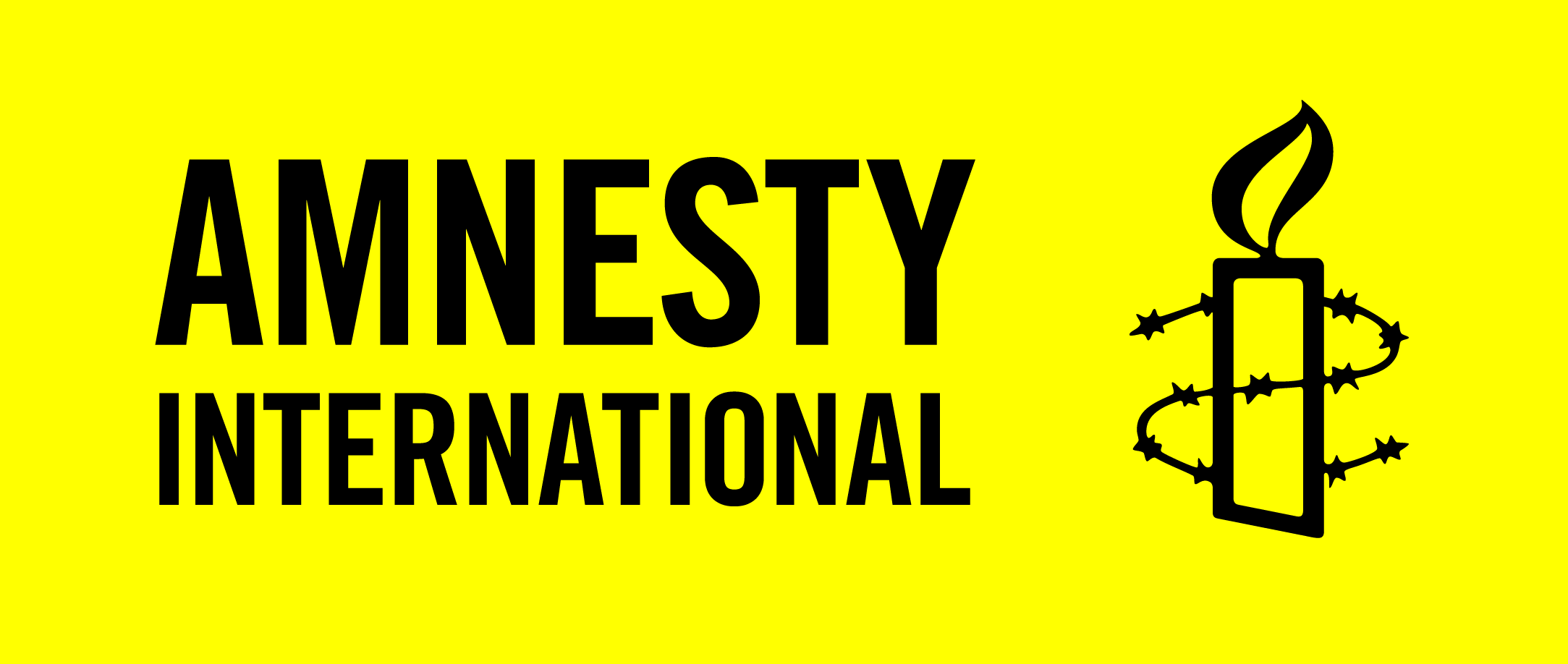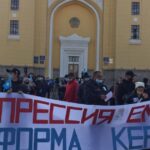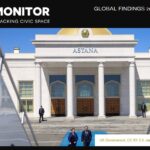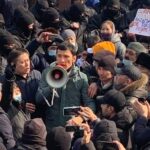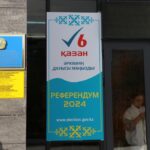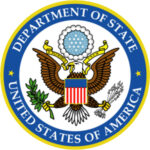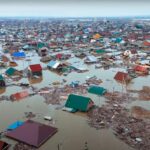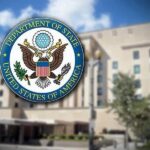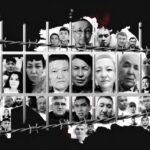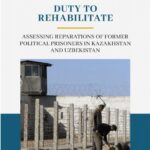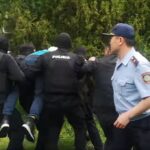The rights to freedom of expression and peaceful assembly remained severely limited and human rights organizations and trade unions faced restrictions. Torture and other ill-treatment remained widespread. People with disabilities continued to face challenges in claiming their basic human rights. LGBTI people faced high levels of discrimination and abuse. Asylum seekers fleeing human rights abuses in China faced imprisonment and discrimination.
Background
In parliamentary elections held on 10 January, the ruling Nur Otan party won 71% of the vote. The OSCE election monitoring mission found that voter choice was limited by “undue restrictions on fundamental freedoms of association, peaceful assembly and expression”.
On 10 June, President Tokayev published a Plan of Priority Measures for Human Rights which specifically mentioned the rights of people with disabilities, elimination of discrimination against women and the rights to freedom of association and expression but omitted the right to freedom of peaceful assembly.
According to the WHO, by December there had been 1,060,125 confirmed cases of Covid-19 and 17,972 deaths, and 16,813,018 vaccine doses had been administered. On 6 September, compulsory vaccination was introduced for workers in retail, sport, culture, health and local government organizations. Those not vaccinated were required to take weekly tests.
On 14 October, Kazakhstan was elected to the UN Human Rights Council.
On 29 December, President Tokayev signed off a law abolishing the death penalty and thus fulfilling the requirements for ratification of the Second Optional Protocol to the ICCPR.
Freedom of expression
The authorities sought to silence criticism of the government using restrictive legislation. Even though libel was decriminalized in 2020, the Criminal Code retains articles criminalizing “Public insults and other attacks on the honour and dignity of the First President” (Article 373) and “Attacks on the honour and dignity of the President” (Article 375).
On 10 August, a court in Taldykorgan ruled, in civil proceedings, that Serik Kulmyrza and eight other people should remove social media posts because they insulted “the First President of Kazakhstan” (Nursultan Nazarbayev) and “created a negative image of the human rights situation in the country”. The court recommended that prosecutors should open a criminal case under Articles 373 and 375 of the Criminal Code. Only one of the defendants took part in the hearing via WhatsApp and the others only heard of the decision via the media in October.
On 15 September, parliament approved amendments to laws intended to protect children from cyberbullying. The amendments require foreign internet platforms and messenger applications to register and have representatives in Kazakhstan, or face being blocked. Human rights defenders criticized these legislative changes as a means of unduly restricting the right to freedom of expression and access to information.
On 7 October, an ambulance driver, Kenzhebulat Esimseitov, was detained and questioned by police under Article 274 of the Criminal Code for “distribution of knowingly false information”. He was among 24 ambulance drivers who had signed a letter to officials complaining about conditions at the Ambulance Service, including the failure to pay drivers the additional sum due to them because of the Covid-19 pandemic. At the end of the year the case had not been closed, but was not being actively investigated.
Extremism legislation
There was a rise in the number of people convicted under Article 405 of the Criminal Code for membership of an “extremist” organization. By October, there had been 47 convictions, compared to 14 in 2020. All of those convicted had simply expressed criticism of the government or supported the opposition movements Democratic Choice of Kazakhstan and Koshe Partiyasi, which had been arbitrarily declared “extremist” in closed court sessions in 2018 and 2020, respectively.
On 11 October, Askhat Zheksebaev was sentenced to five years in prison for belonging to an “extremist party”. He was one of the founders of Koshe Partiyasi and had been in detention since August 2020. He was among 13 opposition activists convicted in a politically motivated trial.
On 4 February, prisoner of conscience Maks Bokaev was released from detention after serving a five-year sentence. He remained subject to three years of “administrative supervision”, which restricts his rights to freedom of peaceful assembly, expression and association.1
Right to privacy
The mobile devices of at least four Kazakhstani activists were targeted and infected with NSO Group’s Pegasus spyware from June. The four were members of the youth movement Oyan, Qazaqstan.2
Freedom of assembly
Requests to hold demonstrations were frequently denied under overly restrictive legislation. According to human rights monitors, between July 2020 and October 2021, 133 applications to local authorities in 22 cities were arbitrarily refused. Of those, 103 were in 2021. Peaceful demonstrators were subjected to ill-treatment and “kettling”, amounting to arbitrary detention by law enforcement officers.
On 10 January, a group of about 12 peaceful demonstrators were surrounded by police officers and forced to stand outside in sub-zero temperatures for over nine hours before being released. They were not given access to a toilet or food and drink. One woman was taken to hospital suffering from hypothermia.
Freedom of association
In January, three NGOs – the Kazakhstani International Bureau for Human Rights, the International Legal Initiative and Echo, an election monitoring group – were arbitrarily suspended for three months, and NGO Erkindik Kanaty was fined under restrictive tax regulations. All had been notified in November 2020 that they had purportedly violated Article 460-1 of the Code on Administrative Violations for failing to properly report on foreign funds each had received, in some cases dating back to 2018.
Workers’ rights
Despite reforms in 2020 that made registration of trade unions easier, some still faced disproportionate bureaucratic hurdles. On 5 February, the Specialized Inter-district Economic Court in Shymkent suspended the independent Industrial Trade Union of Fuel and Energy Workers for six months for failing to register in accordance with the restrictive trade union law.
Torture and other ill-treatment
According to the report of the National Preventative Mechanism (NPM) for the prevention of torture published in 2021, 63 reports of torture were registered in 2020 and 13 individuals were sentenced. The NPM also noted the poor conditions in detention facilities. Many facilities were inadequately heated during the winter, food was inadequate and there was a severe shortage of medical staff, who continued to be employed by the Penitentiary Administration.
On 15 October, a court in Öskemen sentenced seven prison guards to between five and 10 years’ imprisonment for torturing 25-year-old Andrei Kondratenko. He died in prison on 18 July 2019 after being tortured by prison guards. A witness testified that guards held his head underwater and deprived him of sleep; the witness also testified that guards then forced other prisoners to take Andrei Kondratenko’s body to the punishment cell and make it appear that he had hanged himself.
Rights of people with disabilities
People with mental disabilities continued to be deprived of legal capacity by the courts, and thereby of their human rights, including the rights to education, a private life, to vote and to stand for office. In July, the OSCE recommended that all restrictions on the right to vote and stand for office should be lifted and that Kazakhstan introduce laws and policies allowing people with disabilities to access support in exercising their legal capacity rather than being deprived of it.
LGBTI people’s rights
LGBTI people faced discrimination, marginalization and physical attacks from state and non-state actors.
In May, Zhanar Sekerbayeva and Gulzada Serzhan, founders of the queer feminist collective, Feminita, were physically attacked and abused by an angry mob when they attempted to hold a human rights conference at a hotel in Shymkent. Police officers failed to protect their right to peaceful assembly and forcibly detained them, later claiming that they were detained for their own protection. After the hotel cancelled their booking, they moved to a nearby cafe where an angry mob of men attacked them and punched Zhanar Sekerbayeva in the face. Police officers were in the mob and in video footage can be seen forcing the two activists into police cars. In Karaganda on 28 July, both activists were again attacked by an angry mob when they tried to hold a women’s rights conference. Neither incident had been investigated by the police by the end of the year.
Refugees’ and migrants’ rights
Ethnic Kazakhs fleeing Xinjian in China faced criminal prosecution and imprisonment for crossing the border irregularly, as well as discrimination, inadequate protection, and administrative hurdles, including needing to renew their documents annually and not having the right to travel abroad. In April, three ethnic Kazakhs who had fled from Xinjiang were denied citizenship on the grounds that they had crossed the border irregularly.
- Kazakhstan: Prisoner of Conscience Maks Bokaev Released but Restrictions Must be Lifted (Index: EUR 57/3625/2021), 4 February
- “Kazakhstan: Four activists’ mobile devices infected with Pegasus spyware”, 9 December
https://www.amnesty.org/en/location/europe-and-central-asia/kazakhstan/report-kazakhstan/

